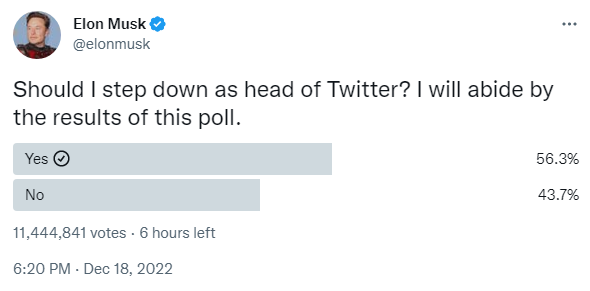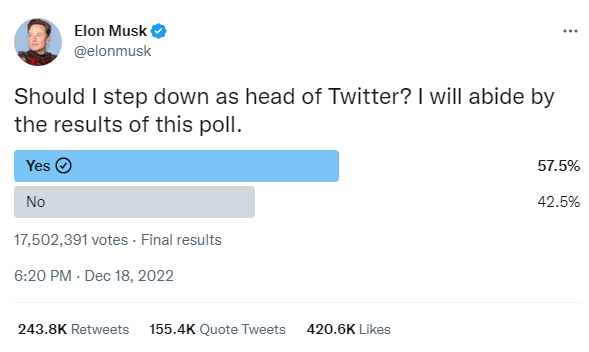
🏅 Top traders
| # | Trader | Total profit |
|---|---|---|
| 1 | Ṁ262 | |
| 2 | Ṁ58 | |
| 3 | Ṁ54 | |
| 4 | Ṁ49 | |
| 5 | Ṁ35 |
People are also trading
@AmmonLam Would 57.1% have been over 57%? Would the question be the same if it’d said ‘over 57.0%’?
@NicoDelon ...Yes? Any number larger than 57 is "over 57". I'm confused where the disconnect is.
@NicoDelon How is it vague? I don't see how you get more specific than an exact percentage.
@NicoDelon As you're now discovering, >X does not mean the same thing as >=X+1. Non-integers exist. I'm pretty sure the vast majority of people on a prediction market site are aware of that, so I don't think any clarification was needed.
Note that the market description doesn't say anything about rounding to the nearest integer, nor does Twitter's poll display do that. (Twitter does round to the nearest 10th of an integer, which could have been an issue if it displayed "57%" but the actual vote count was 57.01% or something like that. But luckily that didn't occur.)
If a market asked whether something would happen after 4:00, and it happened at 4:30, would you argue that it really meant "at or after 5:00"?
@IsaacKing "Twitter does round to the nearest 10th of an integer, which could have been an issue if it displayed "57%" but the actual vote count was 57.01% or something like that. But luckily that didn't occur."
Please stop being condescending. The question could have been interpreted as about percentage points. It’s not obvious what the relevant increments are and it could not have hurt to be specific. I don’t understand why you’re being fussy about that. Other people have asked what ‘over’ meant, which suggests it’s not as clear as you claim.
@NicoDelon I'm not trying to be condescending, sorry. I'm trying to understand why you think the result should be rounded when the market didn't say anything about that. I'm legitimately confused; I can't recall encountering someone else who thought about numbers this way before.
@IsaacKing I agree. If we’re asking whether something will happen by 4:00. But if I ask you what time it is. Is it 4:00 or 4:01?
@IsaacKing I also didn’t claim anything about what the market should be. I’ve only asked for a clarification. That’s what people do here even in the most evident cases. You can offer the clarification. You don’t have to be patronizing about it.
@NicoDelon When someone is asked what time it is, there's an implicit agreement that the answer will be rounded, because the asker doesn't care about small variations and wold prefer brevity. The exact amount of rounding that's acceptable is dependent on context. If someone wants to go for a walk before it gets dark and asks "what time is it", rounding to the nearest half hour is probably fine. If someone realizes they're late to the airport and panically asks what time it is, you probably want to give them the exact minute. If they're trying to time a footrace, you'd want to answer down to the second. Such an answer can't be accurate down to less than ~1 second, since it takes a nonzero amount of time to speak, so it'd be useless to answer with more precision than that.
@IsaacKing "The exact amount of rounding that's acceptable is dependent on context."
Exactly.
@NicoDelon Right, and the context is that there's a good reason to round, and it's socially acceptable to do so. This market would be more analogous to me asking someone "hey, did that event happen after 4:05?", and they see that it happened at 4:06, but round that to 4:00 and tell me "no", which would obviously be ridiculous and not what I wanted to know.
@IsaacKing "'did that event happen after 4:05?', and they see that it happened at 4:06, but round that to 4:00"
No one said it should round to anything under 57%. This is a ridiculous analogy.

